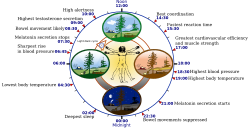Somnolence

Editor-In-Chief: Prab R Tumpati, MD
Obesity, Sleep & Internal medicine
Founder, WikiMD Wellnesspedia &
W8MD's medical weight loss NYC, sleep center NYC
Philadelphia medical weight loss and Philadelphia sleep clinics
| Somnolence | |
|---|---|

| |
| Synonyms | N/A |
| Pronounce | N/A |
| Specialty | N/A |
| Symptoms | Excessive daytime sleepiness, drowsiness, lethargy |
| Complications | Impaired cognitive function, accidents, reduced quality of life |
| Onset | Can occur at any age |
| Duration | Varies depending on cause |
| Types | N/A |
| Causes | Sleep deprivation, medication side effects, sleep disorders, mental health disorders, neurological disorders |
| Risks | Sleep apnea, narcolepsy, depression, anxiety, shift work |
| Diagnosis | Clinical evaluation, sleep study |
| Differential diagnosis | Fatigue, hypersomnia, insomnia |
| Prevention | Good sleep hygiene, regular sleep schedule, stress management |
| Treatment | Address underlying cause, medication, behavioral therapy |
| Medication | N/A |
| Prognosis | Depends on underlying cause |
| Frequency | Common |
| Deaths | N/A |
Overview of somnolence in medical terms
Somnolence, also known as drowsiness, is a state of strong desire for sleep, or sleeping for unusually long periods (hypersomnia). It is considered a symptom rather than a disorder and can be caused by various factors, including sleep disorders, medications, and medical conditions.
Causes[edit]
Somnolence can be caused by a variety of factors, including:
- Sleep disorders such as insomnia, sleep apnea, and narcolepsy.
- Use of certain medications, particularly those with sedative effects, such as antihistamines, antidepressants, and benzodiazepines.
- Medical conditions such as hypothyroidism, diabetes, and chronic fatigue syndrome.
- Mental health issues, including depression and anxiety disorders.
- Disruption of the circadian rhythm, which can occur due to shift work, jet lag, or irregular sleep schedules.
Symptoms[edit]
The primary symptom of somnolence is an overwhelming sense of sleepiness. Other symptoms may include:
- Difficulty staying awake during the day.
- Reduced alertness and concentration.
- Frequent yawning.
- Feeling sluggish or lethargic.
Diagnosis[edit]
Diagnosing somnolence involves identifying the underlying cause. This may include:
- A thorough medical history and physical examination.
- Sleep studies, such as polysomnography, to assess sleep patterns and identify sleep disorders.
- Blood tests to check for underlying medical conditions.
- Review of current medications to identify potential side effects.
Treatment[edit]
Treatment of somnolence focuses on addressing the underlying cause. Options may include:
- Adjusting medications that may contribute to drowsiness.
- Treating underlying medical conditions, such as thyroid hormone replacement for hypothyroidism.
- Implementing good sleep hygiene practices, such as maintaining a regular sleep schedule and creating a restful sleep environment.
- Using stimulant medications in cases of excessive daytime sleepiness due to conditions like narcolepsy.
Prevention[edit]
Preventing somnolence involves maintaining a healthy lifestyle and good sleep habits:
- Establish a regular sleep schedule by going to bed and waking up at the same time each day.
- Create a comfortable sleep environment that is dark, quiet, and cool.
- Avoid caffeine and heavy meals close to bedtime.
- Engage in regular physical activity, but not too close to bedtime.
See also[edit]
Ad. Transform your life with W8MD's Budget GLP-1 injections from $75


W8MD offers a medical weight loss program to lose weight in Philadelphia. Our physician-supervised medical weight loss provides:
- Weight loss injections in NYC (generic and brand names):
- Zepbound / Mounjaro, Wegovy / Ozempic, Saxenda
- Most insurances accepted or discounted self-pay rates. We will obtain insurance prior authorizations if needed.
- Generic GLP1 weight loss injections from $75 for the starting dose.
- Also offer prescription weight loss medications including Phentermine, Qsymia, Diethylpropion, Contrave etc.
NYC weight loss doctor appointmentsNYC weight loss doctor appointments
Start your NYC weight loss journey today at our NYC medical weight loss and Philadelphia medical weight loss clinics.
- Call 718-946-5500 to lose weight in NYC or for medical weight loss in Philadelphia 215-676-2334.
- Tags:NYC medical weight loss, Philadelphia lose weight Zepbound NYC, Budget GLP1 weight loss injections, Wegovy Philadelphia, Wegovy NYC, Philadelphia medical weight loss, Brookly weight loss and Wegovy NYC
|
WikiMD's Wellness Encyclopedia |
| Let Food Be Thy Medicine Medicine Thy Food - Hippocrates |
Medical Disclaimer: WikiMD is not a substitute for professional medical advice. The information on WikiMD is provided as an information resource only, may be incorrect, outdated or misleading, and is not to be used or relied on for any diagnostic or treatment purposes. Please consult your health care provider before making any healthcare decisions or for guidance about a specific medical condition. WikiMD expressly disclaims responsibility, and shall have no liability, for any damages, loss, injury, or liability whatsoever suffered as a result of your reliance on the information contained in this site. By visiting this site you agree to the foregoing terms and conditions, which may from time to time be changed or supplemented by WikiMD. If you do not agree to the foregoing terms and conditions, you should not enter or use this site. See full disclaimer.
Credits:Most images are courtesy of Wikimedia commons, and templates, categories Wikipedia, licensed under CC BY SA or similar.
Translate this page: - East Asian
中文,
日本,
한국어,
South Asian
हिन्दी,
தமிழ்,
తెలుగు,
Urdu,
ಕನ್ನಡ,
Southeast Asian
Indonesian,
Vietnamese,
Thai,
မြန်မာဘာသာ,
বাংলা
European
español,
Deutsch,
français,
Greek,
português do Brasil,
polski,
română,
русский,
Nederlands,
norsk,
svenska,
suomi,
Italian
Middle Eastern & African
عربى,
Turkish,
Persian,
Hebrew,
Afrikaans,
isiZulu,
Kiswahili,
Other
Bulgarian,
Hungarian,
Czech,
Swedish,
മലയാളം,
मराठी,
ਪੰਜਾਬੀ,
ગુજરાતી,
Portuguese,
Ukrainian